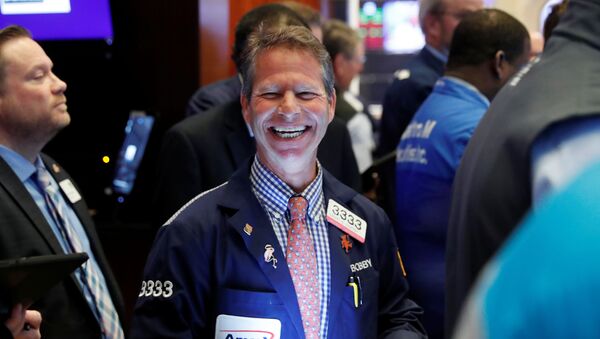Tuesday marked a historic rebound for the American stock market, which has been gripped for weeks by a wave of worry over the COVID-19 pandemic.
The benchmark Dow Jones Industrial Average had skyrocketed 2,093 points, or 11.3 percent, by the time markets closed – its best one-day percentage gain since 1933.
The S&P 500 Index surged 209.93 points, or 9.4 percent, in its strongest day since 2008, while the Nasdaq had its best session in 7 days with a 8.1-percent gain (557.18 points).
What was behind the gains?
That rally came following the news that the Trump administration was nearing a compromise in the Senate over a historic $2-trillion emergency aid package.
The deal was finally reached on Tuesday night following five days of stalled talks, and a vote is expected later in the day to quickly push the bill through Congress.
In a rare move, the Senate Republicans conceded to some major demands from the Democrats, including expanded unemployment benefits and stricter oversight over a $500-billion loan programme for troubled corporations. The bill also includes one-time direct payments to individuals and massive cash injections into smaller businesses to help them deal with payroll problems while they are forced to lay off workers.
The coronavirus-inspired social distancing rules have crippled vital industries like leisure, travel and hospitality, so news of the Senate compromise sent the stocks of many airline, cruise and casino operators soaring on Tuesday.
What other measures it the goverment taking?
President Donald Trump is toying with the idea of reopening the shut-down parts of the economy in three weeks despite warnings from his health officials that this might accelerate the spread of the virus and overload the health care system.
Trump, who has touted growth in the stock and job market as his key accomplishments ever since he took office, likely believes that economic success is his best argument for re-election this November.
Earlier this month, the Federal Reserve unleashed its own extensive rescue programme to support the flow of credit to consumers and businesses, and announced that it would be purchasing corporate bonds, as well as corporate and municipal debt, for the first time in history to prevent an economic depression.
The passage of the emergency relief package will likely mean further gains for the stock market. Coupled with the slowing spread of the virus, it could lead the US economy and stock market to rebound faster than many expect, according to top JPMorgan strategist Marko Kolanovic.
Kolanovic believes that the economy could restart in a “number of weeks”, with the S&P 500 index returning to record levels by early 2021.

